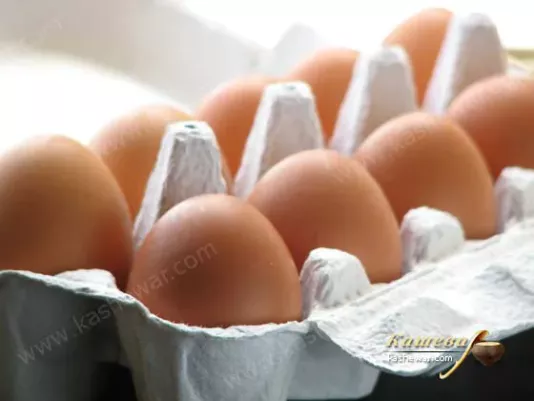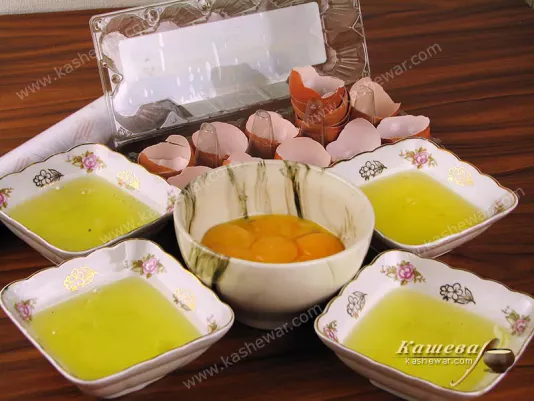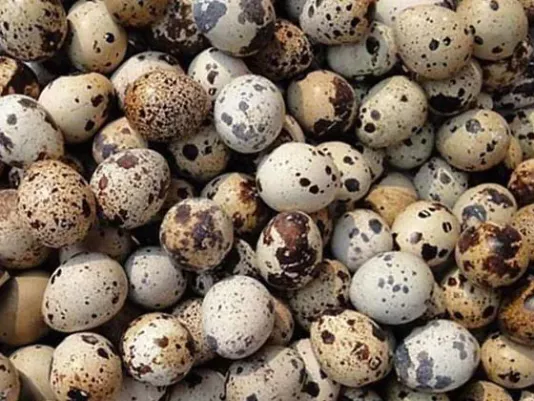Eggs
Eggs are a product I value for their versatility and nutritional value. They contain high-quality protein, vitamins, and minerals essential for a healthy diet. In my practice, eggs are always at hand: I use them for quick meals like omelets or fried eggs, for doughs and creams in baking, as well as for sauces and desserts. I always pay attention to the freshness and quality of eggs, as the final result of any dish depends on it. I enjoy experimenting with different types of eggs: chicken – the basis of most recipes, quail – dietary and especially delicate, and whites and yolks separately reveal wide culinary possibilities. All this makes eggs an irreplaceable product in my kitchen.
Different Types of Eggs
Chicken Eggs
Chicken eggs are the main type for me, which I use almost daily. They are always in my fridge, as they help me quickly prepare a nutritious breakfast or create the base for many other dishes. I make scrambled eggs, omelets, boil them hard- or soft-boiled, and add them to salads and snacks. But most of all, I value chicken eggs for their versatility in baking: they make dough more elastic, help it rise, and give baked goods a beautiful golden color. The yolk gives dishes tenderness and richness, while the white adds lightness and stability. I am sure that chicken eggs are the most convenient for cooking, as they are affordable, nutritious, and combine well with any ingredients. I always choose fresh eggs from trusted producers, paying attention to labeling and expiration dates. In my practice, I am convinced that quality chicken eggs guarantee successful results in any dish – from the simplest breakfast to a complex cake.
Quail Eggs
I especially love quail eggs for their delicate taste and health benefits. They are small in size but very nutritious: they contain more vitamins and minerals compared to chicken eggs and are also easier for the body to digest. I often use them in salads or serve them as a separate appetizer, boiling quail eggs soft- or hard-boiled. They look wonderful on a festive table thanks to their miniature size and are also popular with children because they are easy to eat. In my practice, quail eggs often replace chicken eggs in dishes where lightness and delicate flavor are needed. I add them to soups, appetizers, and have even used them in baking to give dough a more tender texture. For me, quail eggs are not only an original ingredient but also an opportunity to diversify the diet, make it healthier, and at the same time more interesting. I always enjoy working with them, as they give any dish a special charm and refinement.
Duck and Turkey Eggs
Duck and turkey eggs have always been interesting alternatives to the usual chicken eggs for me. They are larger in size, have a richer flavor, and denser yolks, which give dishes special expressiveness. I use them less often but always with curiosity when experimenting. Duck eggs are well suited for baking: they make dough richer and more aromatic, give it a beautiful color, and a special structure. I have used turkey eggs for preparing omelets and casseroles, as they give dishes satiety and deeper flavor. However, I always emphasize that such eggs must be thoroughly cooked, as their dense structure requires longer preparation, and it is also important to ensure safety. In my practice, I am convinced that duck and turkey eggs are perfect for special occasions when you want to diversify the menu or surprise guests with an unusual ingredient. They bring new culinary shades and allow me to look at familiar recipes differently.
Egg Whites
Egg whites are a real discovery in cooking for me, as they allow me to create special textures and lightness in dishes. I often use them in desserts, where the white plays the main role: meringues, soufflés, or delicate mousses always come out airy and light thanks to well-beaten egg whites. I enjoy this process of whipping, when whites gradually turn into a thick, stable foam, as this is the secret of many successful desserts. In addition, whites help make baked goods more tender and light, adding structure. I also use them in savory dishes, such as dietary omelets without yolks, which turn out very light but nutritious. For me, it is important that whites contain almost no fat but are rich in high-quality protein, making dishes with them healthy and suitable for light meals. In my practice, I am convinced that working with whites requires accuracy: the utensils must be absolutely clean and dry, then the result will always be perfect. Egg whites are an ingredient that helps me create true culinary masterpieces.
Egg Yolks
Egg yolks have always been a symbol of tenderness and richness in dishes for me. They add recipes a bright color, deep flavor, and creamy texture. I use yolks to prepare sauces, including classic hollandaise or homemade mayonnaise, which turn out thick and velvety. In baking, yolks play a key role: they make dough more delicate, give it a golden color, and a special aroma. I love making creams and custard fillings based on yolks, as they create smoothness and uniformity that cannot be achieved without this ingredient. In my practice, I am convinced that yolks also add satiety and nutrition to dishes, as they contain fats and vitamins important for health. For me, yolks are a tool that allows me to create richer and more refined recipes. I always use them carefully and in the right proportions, as they have an intense flavor capable of completely transforming a dish. Yolks are a culinary element without which I cannot imagine many of my favorite recipes.



